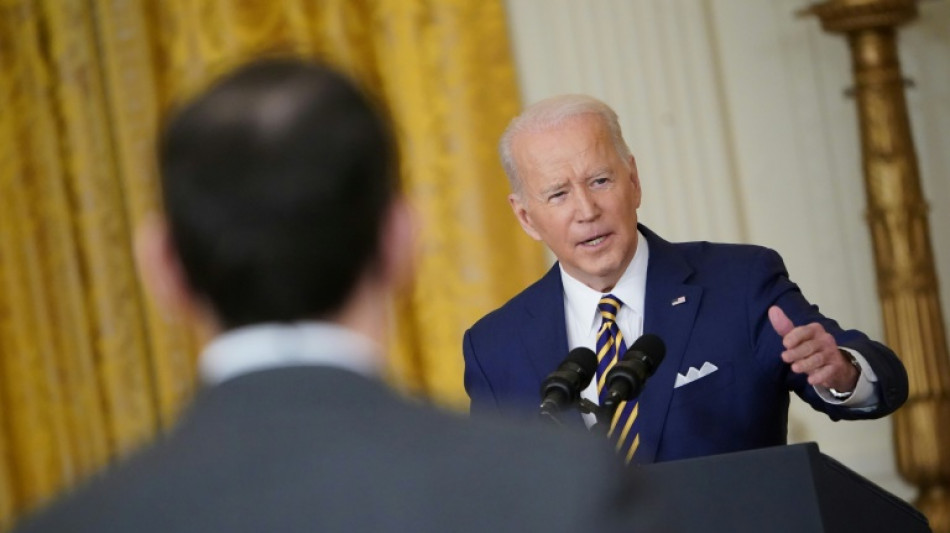
-
 'Nowhere to sleep': Melissa upends life for Jamaicans
'Nowhere to sleep': Melissa upends life for Jamaicans
-
Irish octogenarian enjoys new lease on life making harps

-
 Tanzania blackout after election chaos, deaths feared
Tanzania blackout after election chaos, deaths feared
-
G7 meets on countering China's critical mineral dominance
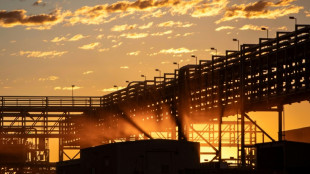
-
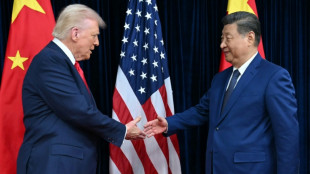 Trump hails tariff, rare earth deal with Xi
Trump hails tariff, rare earth deal with Xi
-
Court rules against K-pop group NewJeans in label dispute

-
 India's Iyer says 'getting better by the day' after lacerated spleen
India's Iyer says 'getting better by the day' after lacerated spleen
-
Yesavage fairytale carries Blue Jays to World Series brink

-
 Bank of Japan keeps interest rates unchanged
Bank of Japan keeps interest rates unchanged
-
Impoverished Filipinos forge a life among the tombstones

-
 Jokic posts fourth straight triple-double as Nuggets rout Pelicans
Jokic posts fourth straight triple-double as Nuggets rout Pelicans
-
UN calls for end to Sudan siege after mass hospital killings

-
 Teenage Australian cricketer dies after being hit by ball
Teenage Australian cricketer dies after being hit by ball
-
As Russia advances on Kupiansk, Ukrainians fear second occupation

-
 Trade truce in balance as Trump meets 'tough negotiator' Xi
Trade truce in balance as Trump meets 'tough negotiator' Xi
-
China to send youngest astronaut, mice on space mission this week

-
 Yesavage gem carries Blue Jays to brink of World Series as Dodgers downed
Yesavage gem carries Blue Jays to brink of World Series as Dodgers downed
-
With inflation under control, ECB to hold rates steady again

-
 Asia stocks muted with all eyes on Trump-Xi meeting
Asia stocks muted with all eyes on Trump-Xi meeting
-
Personal tipping points: Four people share their climate journeys

-
 Moto3 rider Dettwiler 'no longer critical' after crash: family
Moto3 rider Dettwiler 'no longer critical' after crash: family
-
US economy in the dark as government shutdown cuts off crucial data

-
 Trump orders nuclear testing resumption ahead of Xi talks
Trump orders nuclear testing resumption ahead of Xi talks
-
'Utter madness': NZ farmers agree dairy sale to French group

-
 Samsung posts 32% profit rise on-year in third quarter
Samsung posts 32% profit rise on-year in third quarter
-
30 years after cliffhanger vote, Quebec separatists voice hope for independence

-
 Taxes, labor laws, pensions: what Milei wants to do next
Taxes, labor laws, pensions: what Milei wants to do next
-
South Sudan's blind football team dreams of Paralympic glory

-
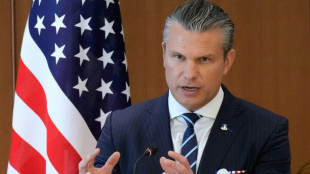 US says 4 killed in new strike on alleged Pacific drug boat
US says 4 killed in new strike on alleged Pacific drug boat
-
What we do and don't know about Rio's deadly police raid

-
 'They slit my son's throat' says mother of teen killed in Rio police raid
'They slit my son's throat' says mother of teen killed in Rio police raid
-
Arteta hails 'special' Dowman after 15-year-old makes historic Arsenal start

-
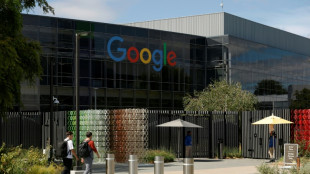 Google parent Alphabet posts first $100 bn quarter as AI fuels growth
Google parent Alphabet posts first $100 bn quarter as AI fuels growth
-
Underwater 'human habitat' aims to allow researchers to make weeklong dives

-
 Maresca slams Delap for 'stupid' red card in Chelsea win at Wolves
Maresca slams Delap for 'stupid' red card in Chelsea win at Wolves
-
'Non-interventionist' Trump flexes muscles in Latin America

-
 Slot defends League Cup selection despite not meeting 'Liverpool standards'
Slot defends League Cup selection despite not meeting 'Liverpool standards'
-
'Poor' PSG retain Ligue 1 lead despite stalemate and Doue injury

-
 Kane nets twice in German Cup as Bayern set European wins record
Kane nets twice in German Cup as Bayern set European wins record
-
Liverpool crisis mounts after League Cup exit against Palace

-
 Juve bounce back after Tudor sacking as Roma, Inter keep pace with leaders Napoli
Juve bounce back after Tudor sacking as Roma, Inter keep pace with leaders Napoli
-
Kane scores twice as Bayern set European wins record

-
 Radio Free Asia suspends operations after Trump cuts and shutdown
Radio Free Asia suspends operations after Trump cuts and shutdown
-
Meta shares sink as $16 bn US tax charge tanks profit

-
 Dollar rises after Fed chair says December rate cut not a given
Dollar rises after Fed chair says December rate cut not a given
-
Google parent Alphabet posts first $100 bn quarter as AI drives growth

-
 Rob Jetten: ex-athlete setting the pace in Dutch politics
Rob Jetten: ex-athlete setting the pace in Dutch politics
-
Juve bounce back after Tudor sacking as Roma keep pace with leaders Napoli

-
 Favorite Sovereignty scratched from Breeders' Cup Classic after fever
Favorite Sovereignty scratched from Breeders' Cup Classic after fever
-
Doue injured as PSG held at Lorient in Ligue 1


Intel to spend $20 bn on US chip plants amid shortage
US semiconductor giant Intel on Friday announced a $20 billion investment to build two new semiconductor plants in Ohio, as a global chip shortage fans the inflation wave weighing on Joe Biden's presidency.
Biden is urging manufacturers to bring production back to the United States, once a leader in making the chips key to everything from vacuums to cars but which have become scarce during the pandemic.
Construction of the plants, which will be near the Midwestern US state's capital Columbus, is scheduled to begin at the end of the year, and chip production could start as early as 2025, the company said.
The White House welcomed the announcement, saying the "administration has been working around the clock with Congress, our international allies and partners, and the private sector to expand US chip manufacturing capacity."
"The US lost its edge -- our share of global semiconductor production has fallen from 37 percent to just 12 percent over the last 30 years," the White House said in a statement.
Problems in global supply chains have highlighted the fundamental importance of semiconductors, which are used in a growing number of products including cars, TVs and smartphones.
Keen demand and the closure of semiconductor plants, particularly in Asia, due to pandemic disruptions led to a global chip shortage that has affected a range of industries from automobiles to video games.
The surge in demand has created bottlenecks, forcing companies to slow production, and sent prices soaring.
"Intel's actions will help build a more resilient supply chain and ensure reliable access to advanced semiconductors for years to come," Intel chief executive Pat Gelsinger said in a statement.
Biden and Gelsinger are due to meet at the White House on Friday.
- Boosting domestic production -
With the pandemic highlighting industrial dependence on imports, governments, particularly in the United States and Europe, have become concerned about securing semiconductor supply after years in which manufacturing has shifted to lower-cost Asian countries.
Geopolitical tensions also play a roles as the chips are largely manufactured in Taiwan, over which China has expressed territorial claims.
Biden's administration wants to invest $52 billion in semiconductor research and production in the United States.
The Senate approved a bill last year but it still needs to pass the House of Representatives.
Intel earlier this year announced a $20 billion investment in two new factories in Arizona.
The company plans to hire 3,000 new workers for the new sites in Ohio, and building the factories will involve 7,000 construction workers.
The announcement Friday comes ahead of an eagerly awaited decision from the California-based group on the location for its European factories, which will make semiconductor components so fine that they are measured in nanometers.
Germany appears to be the favorite to host the Intel site.
Other major players in the microchip sector also are considering locating production closer to American consumers.
South Korean electronics giant Samsung announced in November it would build a $17 billion factory in Texas.
Since the start of 2021, the semiconductor industry has announced nearly $80 billion in new investment in the United States through 2025, according to industry federation data cited by the White House.
E.AbuRizq--SF-PST
